Sustainable and Responsible Tourism Management
VerifiedAdded on 2023/01/12
|15
|5305
|29
AI Summary
This document discusses the concept of sustainable and responsible tourism, the role of global organizations in promoting sustainable tourism, the purpose and principles of tourism development and planning, and the challenges and problems associated with tourism planning. It also includes a case study of Ljubljana, a sustainable tourism destination in the European Union.
Contribute Materials
Your contribution can guide someone’s learning journey. Share your
documents today.
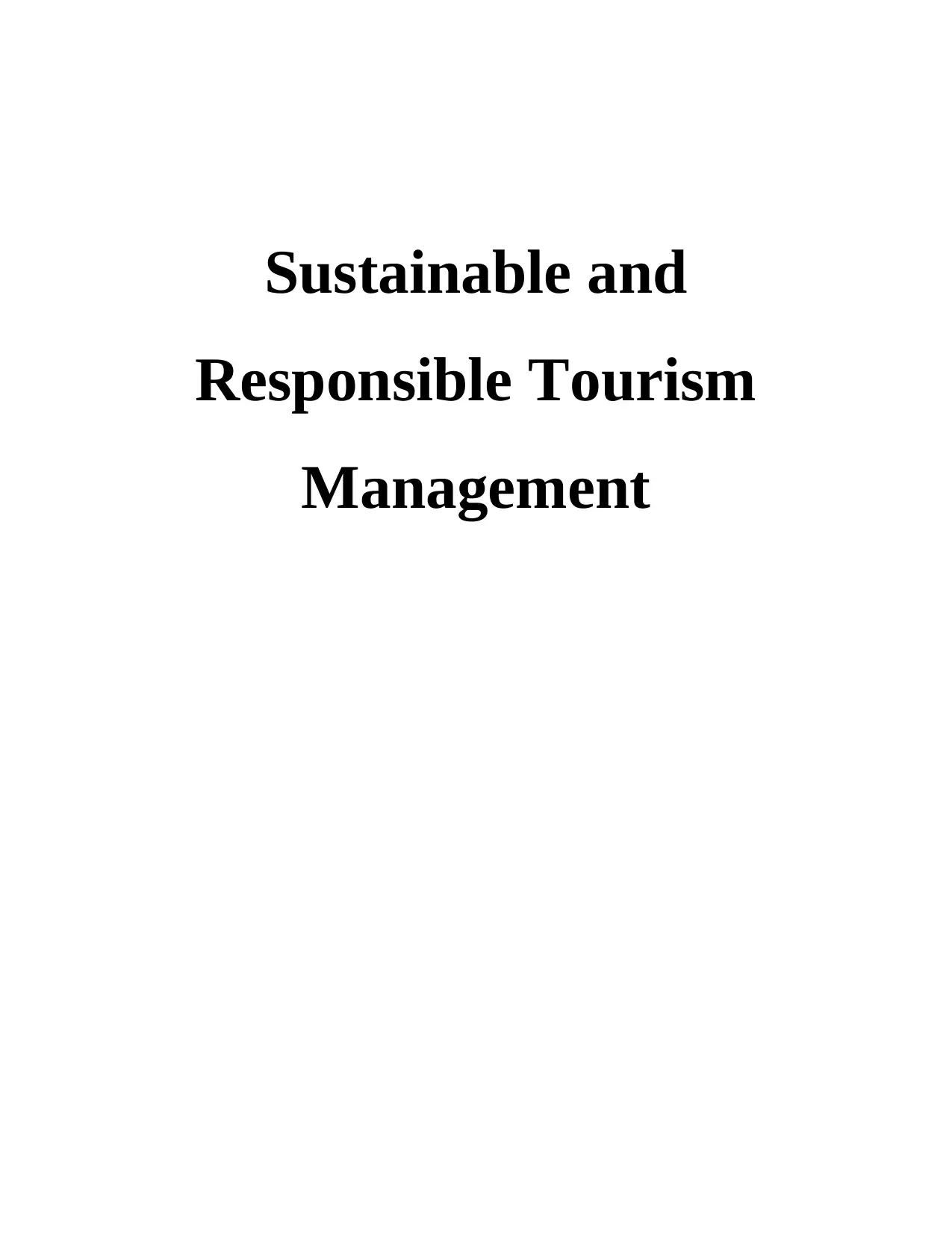
Sustainable and
Responsible Tourism
Management
Responsible Tourism
Management
Secure Best Marks with AI Grader
Need help grading? Try our AI Grader for instant feedback on your assignments.
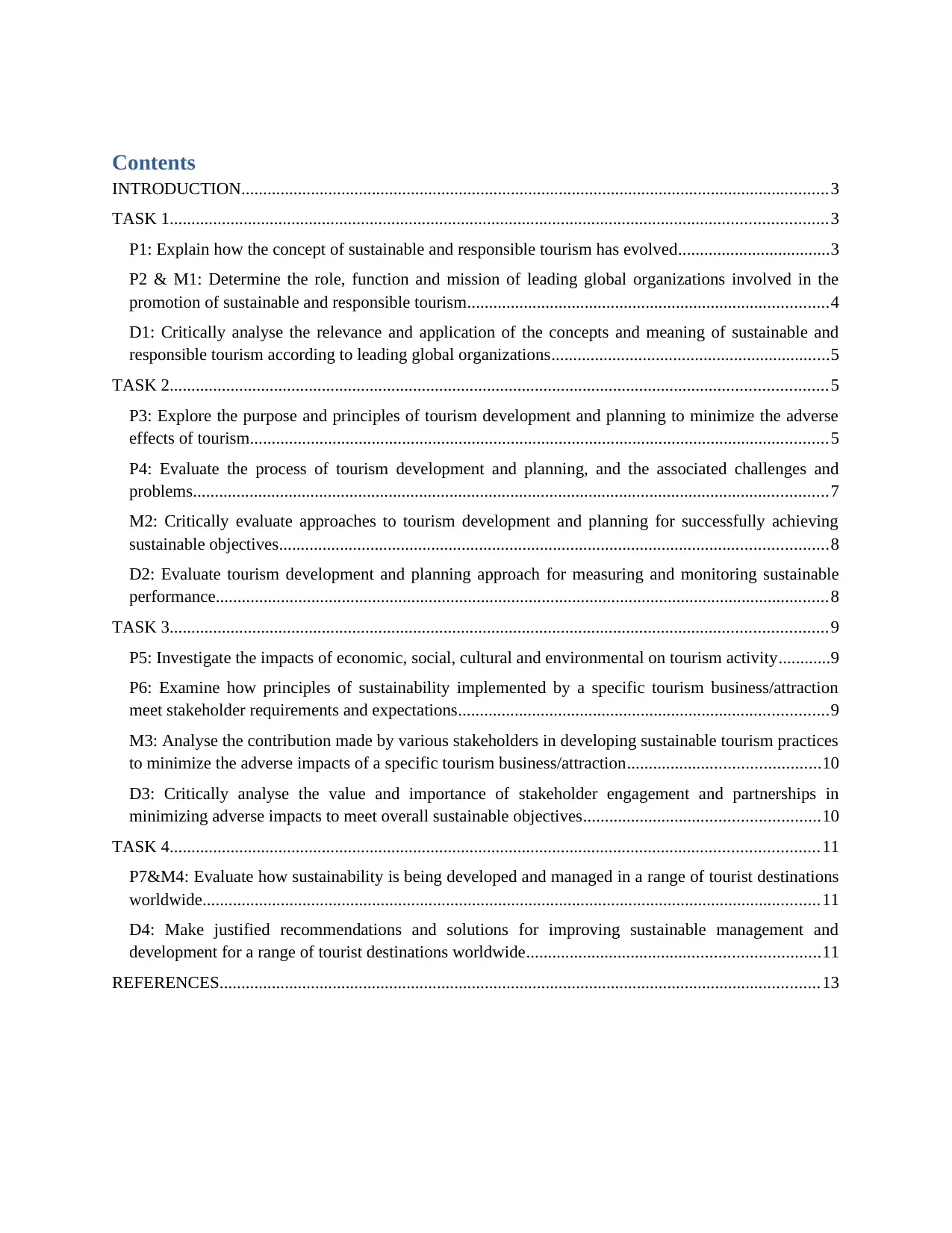
Contents
INTRODUCTION.......................................................................................................................................3
TASK 1.......................................................................................................................................................3
P1: Explain how the concept of sustainable and responsible tourism has evolved...................................3
P2 & M1: Determine the role, function and mission of leading global organizations involved in the
promotion of sustainable and responsible tourism...................................................................................4
D1: Critically analyse the relevance and application of the concepts and meaning of sustainable and
responsible tourism according to leading global organizations................................................................5
TASK 2.......................................................................................................................................................5
P3: Explore the purpose and principles of tourism development and planning to minimize the adverse
effects of tourism.....................................................................................................................................5
P4: Evaluate the process of tourism development and planning, and the associated challenges and
problems..................................................................................................................................................7
M2: Critically evaluate approaches to tourism development and planning for successfully achieving
sustainable objectives..............................................................................................................................8
D2: Evaluate tourism development and planning approach for measuring and monitoring sustainable
performance.............................................................................................................................................8
TASK 3.......................................................................................................................................................9
P5: Investigate the impacts of economic, social, cultural and environmental on tourism activity............9
P6: Examine how principles of sustainability implemented by a specific tourism business/attraction
meet stakeholder requirements and expectations.....................................................................................9
M3: Analyse the contribution made by various stakeholders in developing sustainable tourism practices
to minimize the adverse impacts of a specific tourism business/attraction............................................10
D3: Critically analyse the value and importance of stakeholder engagement and partnerships in
minimizing adverse impacts to meet overall sustainable objectives......................................................10
TASK 4.....................................................................................................................................................11
P7&M4: Evaluate how sustainability is being developed and managed in a range of tourist destinations
worldwide..............................................................................................................................................11
D4: Make justified recommendations and solutions for improving sustainable management and
development for a range of tourist destinations worldwide...................................................................11
REFERENCES..........................................................................................................................................13
INTRODUCTION.......................................................................................................................................3
TASK 1.......................................................................................................................................................3
P1: Explain how the concept of sustainable and responsible tourism has evolved...................................3
P2 & M1: Determine the role, function and mission of leading global organizations involved in the
promotion of sustainable and responsible tourism...................................................................................4
D1: Critically analyse the relevance and application of the concepts and meaning of sustainable and
responsible tourism according to leading global organizations................................................................5
TASK 2.......................................................................................................................................................5
P3: Explore the purpose and principles of tourism development and planning to minimize the adverse
effects of tourism.....................................................................................................................................5
P4: Evaluate the process of tourism development and planning, and the associated challenges and
problems..................................................................................................................................................7
M2: Critically evaluate approaches to tourism development and planning for successfully achieving
sustainable objectives..............................................................................................................................8
D2: Evaluate tourism development and planning approach for measuring and monitoring sustainable
performance.............................................................................................................................................8
TASK 3.......................................................................................................................................................9
P5: Investigate the impacts of economic, social, cultural and environmental on tourism activity............9
P6: Examine how principles of sustainability implemented by a specific tourism business/attraction
meet stakeholder requirements and expectations.....................................................................................9
M3: Analyse the contribution made by various stakeholders in developing sustainable tourism practices
to minimize the adverse impacts of a specific tourism business/attraction............................................10
D3: Critically analyse the value and importance of stakeholder engagement and partnerships in
minimizing adverse impacts to meet overall sustainable objectives......................................................10
TASK 4.....................................................................................................................................................11
P7&M4: Evaluate how sustainability is being developed and managed in a range of tourist destinations
worldwide..............................................................................................................................................11
D4: Make justified recommendations and solutions for improving sustainable management and
development for a range of tourist destinations worldwide...................................................................11
REFERENCES..........................................................................................................................................13
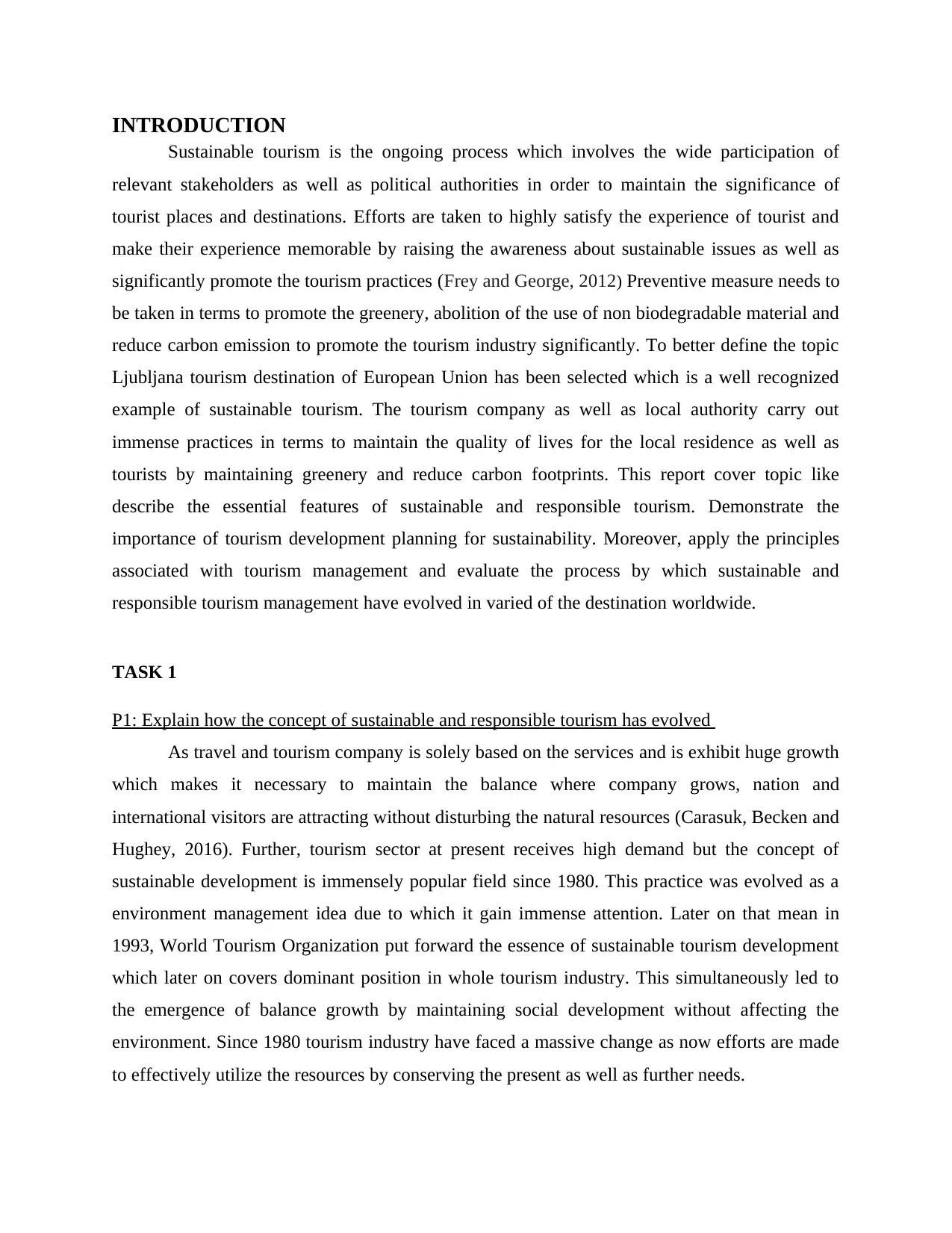
INTRODUCTION
Sustainable tourism is the ongoing process which involves the wide participation of
relevant stakeholders as well as political authorities in order to maintain the significance of
tourist places and destinations. Efforts are taken to highly satisfy the experience of tourist and
make their experience memorable by raising the awareness about sustainable issues as well as
significantly promote the tourism practices (Frey and George, 2012) Preventive measure needs to
be taken in terms to promote the greenery, abolition of the use of non biodegradable material and
reduce carbon emission to promote the tourism industry significantly. To better define the topic
Ljubljana tourism destination of European Union has been selected which is a well recognized
example of sustainable tourism. The tourism company as well as local authority carry out
immense practices in terms to maintain the quality of lives for the local residence as well as
tourists by maintaining greenery and reduce carbon footprints. This report cover topic like
describe the essential features of sustainable and responsible tourism. Demonstrate the
importance of tourism development planning for sustainability. Moreover, apply the principles
associated with tourism management and evaluate the process by which sustainable and
responsible tourism management have evolved in varied of the destination worldwide.
TASK 1
P1: Explain how the concept of sustainable and responsible tourism has evolved
As travel and tourism company is solely based on the services and is exhibit huge growth
which makes it necessary to maintain the balance where company grows, nation and
international visitors are attracting without disturbing the natural resources (Carasuk, Becken and
Hughey, 2016). Further, tourism sector at present receives high demand but the concept of
sustainable development is immensely popular field since 1980. This practice was evolved as a
environment management idea due to which it gain immense attention. Later on that mean in
1993, World Tourism Organization put forward the essence of sustainable tourism development
which later on covers dominant position in whole tourism industry. This simultaneously led to
the emergence of balance growth by maintaining social development without affecting the
environment. Since 1980 tourism industry have faced a massive change as now efforts are made
to effectively utilize the resources by conserving the present as well as further needs.
Sustainable tourism is the ongoing process which involves the wide participation of
relevant stakeholders as well as political authorities in order to maintain the significance of
tourist places and destinations. Efforts are taken to highly satisfy the experience of tourist and
make their experience memorable by raising the awareness about sustainable issues as well as
significantly promote the tourism practices (Frey and George, 2012) Preventive measure needs to
be taken in terms to promote the greenery, abolition of the use of non biodegradable material and
reduce carbon emission to promote the tourism industry significantly. To better define the topic
Ljubljana tourism destination of European Union has been selected which is a well recognized
example of sustainable tourism. The tourism company as well as local authority carry out
immense practices in terms to maintain the quality of lives for the local residence as well as
tourists by maintaining greenery and reduce carbon footprints. This report cover topic like
describe the essential features of sustainable and responsible tourism. Demonstrate the
importance of tourism development planning for sustainability. Moreover, apply the principles
associated with tourism management and evaluate the process by which sustainable and
responsible tourism management have evolved in varied of the destination worldwide.
TASK 1
P1: Explain how the concept of sustainable and responsible tourism has evolved
As travel and tourism company is solely based on the services and is exhibit huge growth
which makes it necessary to maintain the balance where company grows, nation and
international visitors are attracting without disturbing the natural resources (Carasuk, Becken and
Hughey, 2016). Further, tourism sector at present receives high demand but the concept of
sustainable development is immensely popular field since 1980. This practice was evolved as a
environment management idea due to which it gain immense attention. Later on that mean in
1993, World Tourism Organization put forward the essence of sustainable tourism development
which later on covers dominant position in whole tourism industry. This simultaneously led to
the emergence of balance growth by maintaining social development without affecting the
environment. Since 1980 tourism industry have faced a massive change as now efforts are made
to effectively utilize the resources by conserving the present as well as further needs.
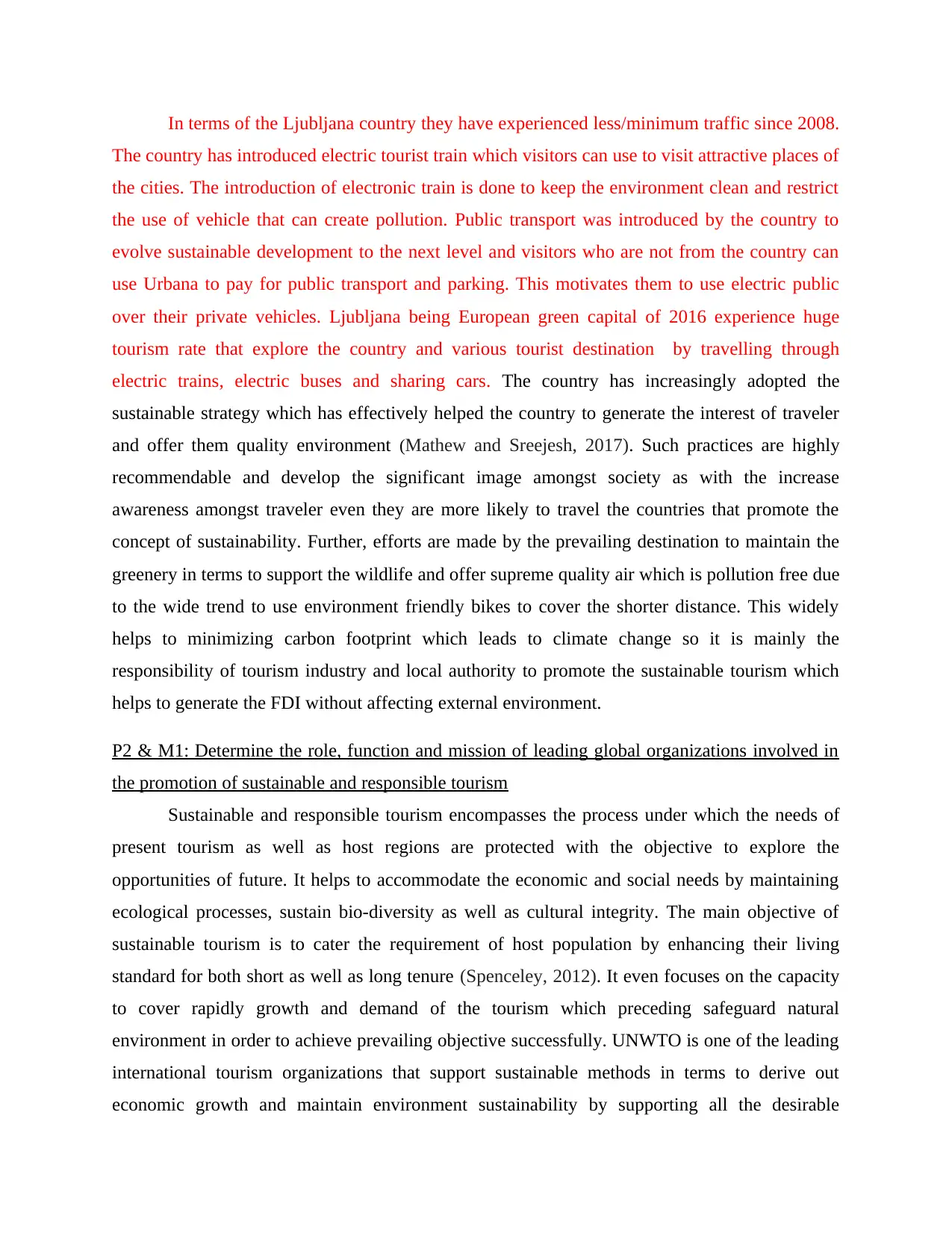
In terms of the Ljubljana country they have experienced less/minimum traffic since 2008.
The country has introduced electric tourist train which visitors can use to visit attractive places of
the cities. The introduction of electronic train is done to keep the environment clean and restrict
the use of vehicle that can create pollution. Public transport was introduced by the country to
evolve sustainable development to the next level and visitors who are not from the country can
use Urbana to pay for public transport and parking. This motivates them to use electric public
over their private vehicles. Ljubljana being European green capital of 2016 experience huge
tourism rate that explore the country and various tourist destination by travelling through
electric trains, electric buses and sharing cars. The country has increasingly adopted the
sustainable strategy which has effectively helped the country to generate the interest of traveler
and offer them quality environment (Mathew and Sreejesh, 2017). Such practices are highly
recommendable and develop the significant image amongst society as with the increase
awareness amongst traveler even they are more likely to travel the countries that promote the
concept of sustainability. Further, efforts are made by the prevailing destination to maintain the
greenery in terms to support the wildlife and offer supreme quality air which is pollution free due
to the wide trend to use environment friendly bikes to cover the shorter distance. This widely
helps to minimizing carbon footprint which leads to climate change so it is mainly the
responsibility of tourism industry and local authority to promote the sustainable tourism which
helps to generate the FDI without affecting external environment.
P2 & M1: Determine the role, function and mission of leading global organizations involved in
the promotion of sustainable and responsible tourism
Sustainable and responsible tourism encompasses the process under which the needs of
present tourism as well as host regions are protected with the objective to explore the
opportunities of future. It helps to accommodate the economic and social needs by maintaining
ecological processes, sustain bio-diversity as well as cultural integrity. The main objective of
sustainable tourism is to cater the requirement of host population by enhancing their living
standard for both short as well as long tenure (Spenceley, 2012). It even focuses on the capacity
to cover rapidly growth and demand of the tourism which preceding safeguard natural
environment in order to achieve prevailing objective successfully. UNWTO is one of the leading
international tourism organizations that support sustainable methods in terms to derive out
economic growth and maintain environment sustainability by supporting all the desirable
The country has introduced electric tourist train which visitors can use to visit attractive places of
the cities. The introduction of electronic train is done to keep the environment clean and restrict
the use of vehicle that can create pollution. Public transport was introduced by the country to
evolve sustainable development to the next level and visitors who are not from the country can
use Urbana to pay for public transport and parking. This motivates them to use electric public
over their private vehicles. Ljubljana being European green capital of 2016 experience huge
tourism rate that explore the country and various tourist destination by travelling through
electric trains, electric buses and sharing cars. The country has increasingly adopted the
sustainable strategy which has effectively helped the country to generate the interest of traveler
and offer them quality environment (Mathew and Sreejesh, 2017). Such practices are highly
recommendable and develop the significant image amongst society as with the increase
awareness amongst traveler even they are more likely to travel the countries that promote the
concept of sustainability. Further, efforts are made by the prevailing destination to maintain the
greenery in terms to support the wildlife and offer supreme quality air which is pollution free due
to the wide trend to use environment friendly bikes to cover the shorter distance. This widely
helps to minimizing carbon footprint which leads to climate change so it is mainly the
responsibility of tourism industry and local authority to promote the sustainable tourism which
helps to generate the FDI without affecting external environment.
P2 & M1: Determine the role, function and mission of leading global organizations involved in
the promotion of sustainable and responsible tourism
Sustainable and responsible tourism encompasses the process under which the needs of
present tourism as well as host regions are protected with the objective to explore the
opportunities of future. It helps to accommodate the economic and social needs by maintaining
ecological processes, sustain bio-diversity as well as cultural integrity. The main objective of
sustainable tourism is to cater the requirement of host population by enhancing their living
standard for both short as well as long tenure (Spenceley, 2012). It even focuses on the capacity
to cover rapidly growth and demand of the tourism which preceding safeguard natural
environment in order to achieve prevailing objective successfully. UNWTO is one of the leading
international tourism organizations that support sustainable methods in terms to derive out
economic growth and maintain environment sustainability by supporting all the desirable
Secure Best Marks with AI Grader
Need help grading? Try our AI Grader for instant feedback on your assignments.
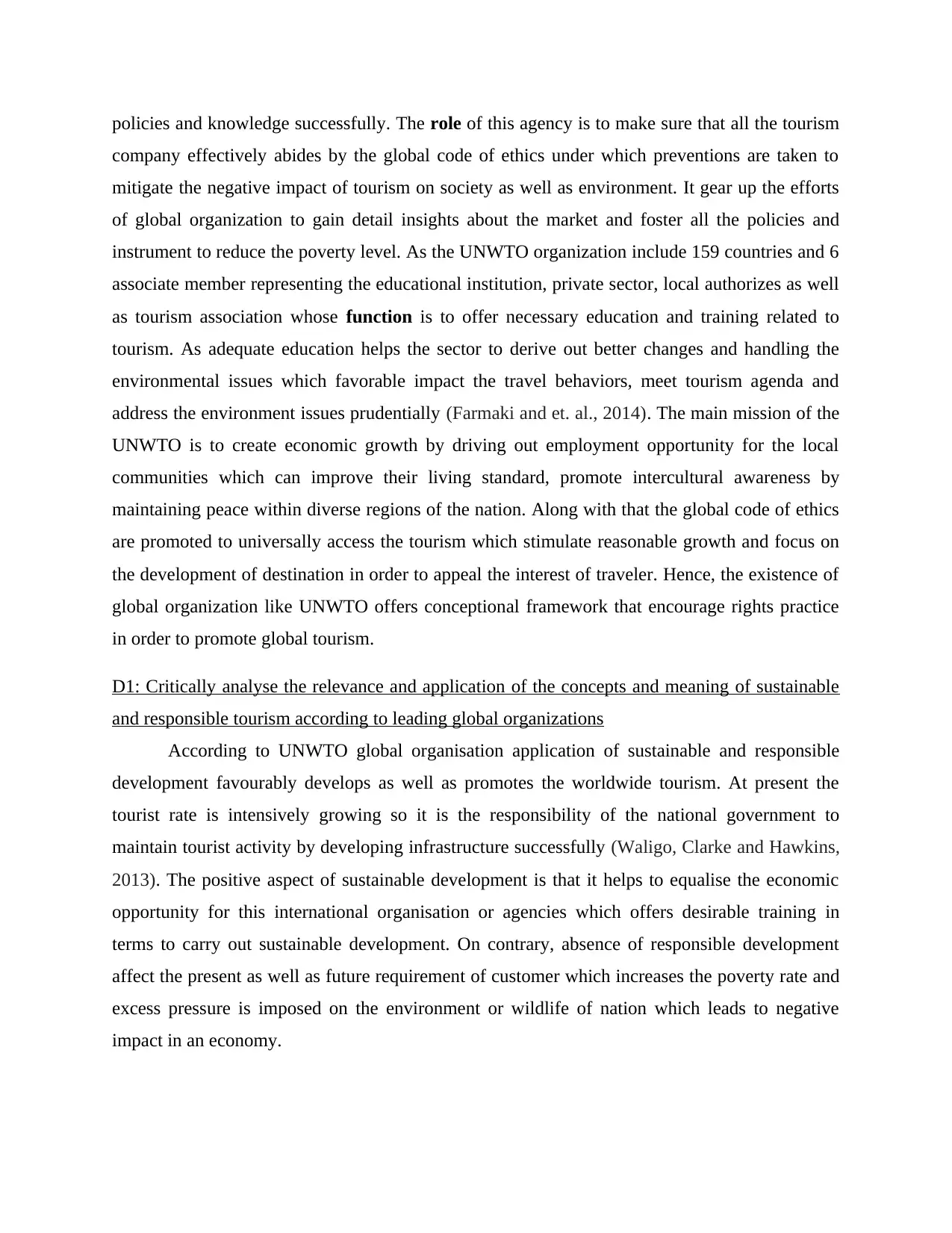
policies and knowledge successfully. The role of this agency is to make sure that all the tourism
company effectively abides by the global code of ethics under which preventions are taken to
mitigate the negative impact of tourism on society as well as environment. It gear up the efforts
of global organization to gain detail insights about the market and foster all the policies and
instrument to reduce the poverty level. As the UNWTO organization include 159 countries and 6
associate member representing the educational institution, private sector, local authorizes as well
as tourism association whose function is to offer necessary education and training related to
tourism. As adequate education helps the sector to derive out better changes and handling the
environmental issues which favorable impact the travel behaviors, meet tourism agenda and
address the environment issues prudentially (Farmaki and et. al., 2014). The main mission of the
UNWTO is to create economic growth by driving out employment opportunity for the local
communities which can improve their living standard, promote intercultural awareness by
maintaining peace within diverse regions of the nation. Along with that the global code of ethics
are promoted to universally access the tourism which stimulate reasonable growth and focus on
the development of destination in order to appeal the interest of traveler. Hence, the existence of
global organization like UNWTO offers conceptional framework that encourage rights practice
in order to promote global tourism.
D1: Critically analyse the relevance and application of the concepts and meaning of sustainable
and responsible tourism according to leading global organizations
According to UNWTO global organisation application of sustainable and responsible
development favourably develops as well as promotes the worldwide tourism. At present the
tourist rate is intensively growing so it is the responsibility of the national government to
maintain tourist activity by developing infrastructure successfully (Waligo, Clarke and Hawkins,
2013). The positive aspect of sustainable development is that it helps to equalise the economic
opportunity for this international organisation or agencies which offers desirable training in
terms to carry out sustainable development. On contrary, absence of responsible development
affect the present as well as future requirement of customer which increases the poverty rate and
excess pressure is imposed on the environment or wildlife of nation which leads to negative
impact in an economy.
company effectively abides by the global code of ethics under which preventions are taken to
mitigate the negative impact of tourism on society as well as environment. It gear up the efforts
of global organization to gain detail insights about the market and foster all the policies and
instrument to reduce the poverty level. As the UNWTO organization include 159 countries and 6
associate member representing the educational institution, private sector, local authorizes as well
as tourism association whose function is to offer necessary education and training related to
tourism. As adequate education helps the sector to derive out better changes and handling the
environmental issues which favorable impact the travel behaviors, meet tourism agenda and
address the environment issues prudentially (Farmaki and et. al., 2014). The main mission of the
UNWTO is to create economic growth by driving out employment opportunity for the local
communities which can improve their living standard, promote intercultural awareness by
maintaining peace within diverse regions of the nation. Along with that the global code of ethics
are promoted to universally access the tourism which stimulate reasonable growth and focus on
the development of destination in order to appeal the interest of traveler. Hence, the existence of
global organization like UNWTO offers conceptional framework that encourage rights practice
in order to promote global tourism.
D1: Critically analyse the relevance and application of the concepts and meaning of sustainable
and responsible tourism according to leading global organizations
According to UNWTO global organisation application of sustainable and responsible
development favourably develops as well as promotes the worldwide tourism. At present the
tourist rate is intensively growing so it is the responsibility of the national government to
maintain tourist activity by developing infrastructure successfully (Waligo, Clarke and Hawkins,
2013). The positive aspect of sustainable development is that it helps to equalise the economic
opportunity for this international organisation or agencies which offers desirable training in
terms to carry out sustainable development. On contrary, absence of responsible development
affect the present as well as future requirement of customer which increases the poverty rate and
excess pressure is imposed on the environment or wildlife of nation which leads to negative
impact in an economy.
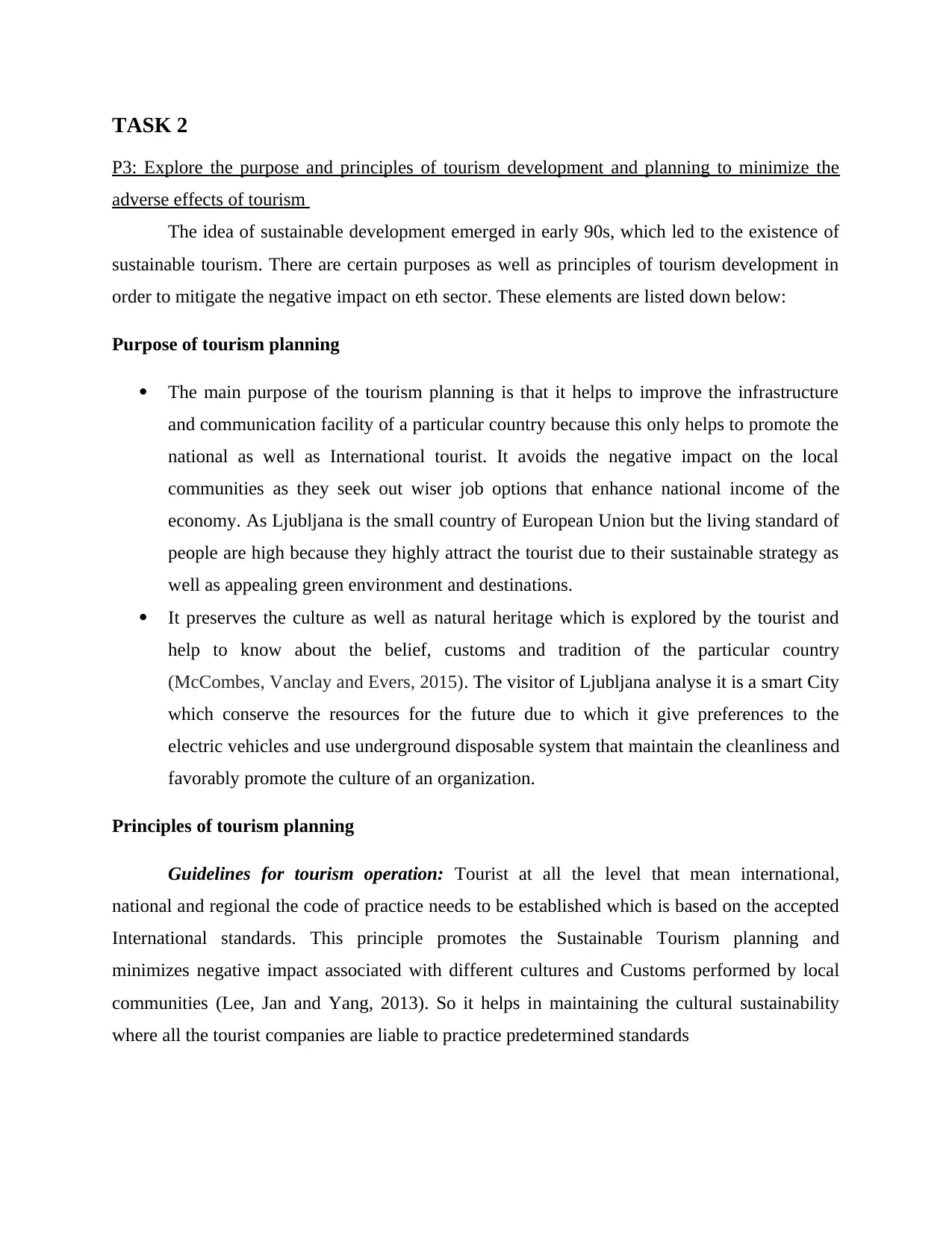
TASK 2
P3: Explore the purpose and principles of tourism development and planning to minimize the
adverse effects of tourism
The idea of sustainable development emerged in early 90s, which led to the existence of
sustainable tourism. There are certain purposes as well as principles of tourism development in
order to mitigate the negative impact on eth sector. These elements are listed down below:
Purpose of tourism planning
The main purpose of the tourism planning is that it helps to improve the infrastructure
and communication facility of a particular country because this only helps to promote the
national as well as International tourist. It avoids the negative impact on the local
communities as they seek out wiser job options that enhance national income of the
economy. As Ljubljana is the small country of European Union but the living standard of
people are high because they highly attract the tourist due to their sustainable strategy as
well as appealing green environment and destinations.
It preserves the culture as well as natural heritage which is explored by the tourist and
help to know about the belief, customs and tradition of the particular country
(McCombes, Vanclay and Evers, 2015). The visitor of Ljubljana analyse it is a smart City
which conserve the resources for the future due to which it give preferences to the
electric vehicles and use underground disposable system that maintain the cleanliness and
favorably promote the culture of an organization.
Principles of tourism planning
Guidelines for tourism operation: Tourist at all the level that mean international,
national and regional the code of practice needs to be established which is based on the accepted
International standards. This principle promotes the Sustainable Tourism planning and
minimizes negative impact associated with different cultures and Customs performed by local
communities (Lee, Jan and Yang, 2013). So it helps in maintaining the cultural sustainability
where all the tourist companies are liable to practice predetermined standards
P3: Explore the purpose and principles of tourism development and planning to minimize the
adverse effects of tourism
The idea of sustainable development emerged in early 90s, which led to the existence of
sustainable tourism. There are certain purposes as well as principles of tourism development in
order to mitigate the negative impact on eth sector. These elements are listed down below:
Purpose of tourism planning
The main purpose of the tourism planning is that it helps to improve the infrastructure
and communication facility of a particular country because this only helps to promote the
national as well as International tourist. It avoids the negative impact on the local
communities as they seek out wiser job options that enhance national income of the
economy. As Ljubljana is the small country of European Union but the living standard of
people are high because they highly attract the tourist due to their sustainable strategy as
well as appealing green environment and destinations.
It preserves the culture as well as natural heritage which is explored by the tourist and
help to know about the belief, customs and tradition of the particular country
(McCombes, Vanclay and Evers, 2015). The visitor of Ljubljana analyse it is a smart City
which conserve the resources for the future due to which it give preferences to the
electric vehicles and use underground disposable system that maintain the cleanliness and
favorably promote the culture of an organization.
Principles of tourism planning
Guidelines for tourism operation: Tourist at all the level that mean international,
national and regional the code of practice needs to be established which is based on the accepted
International standards. This principle promotes the Sustainable Tourism planning and
minimizes negative impact associated with different cultures and Customs performed by local
communities (Lee, Jan and Yang, 2013). So it helps in maintaining the cultural sustainability
where all the tourist companies are liable to practice predetermined standards
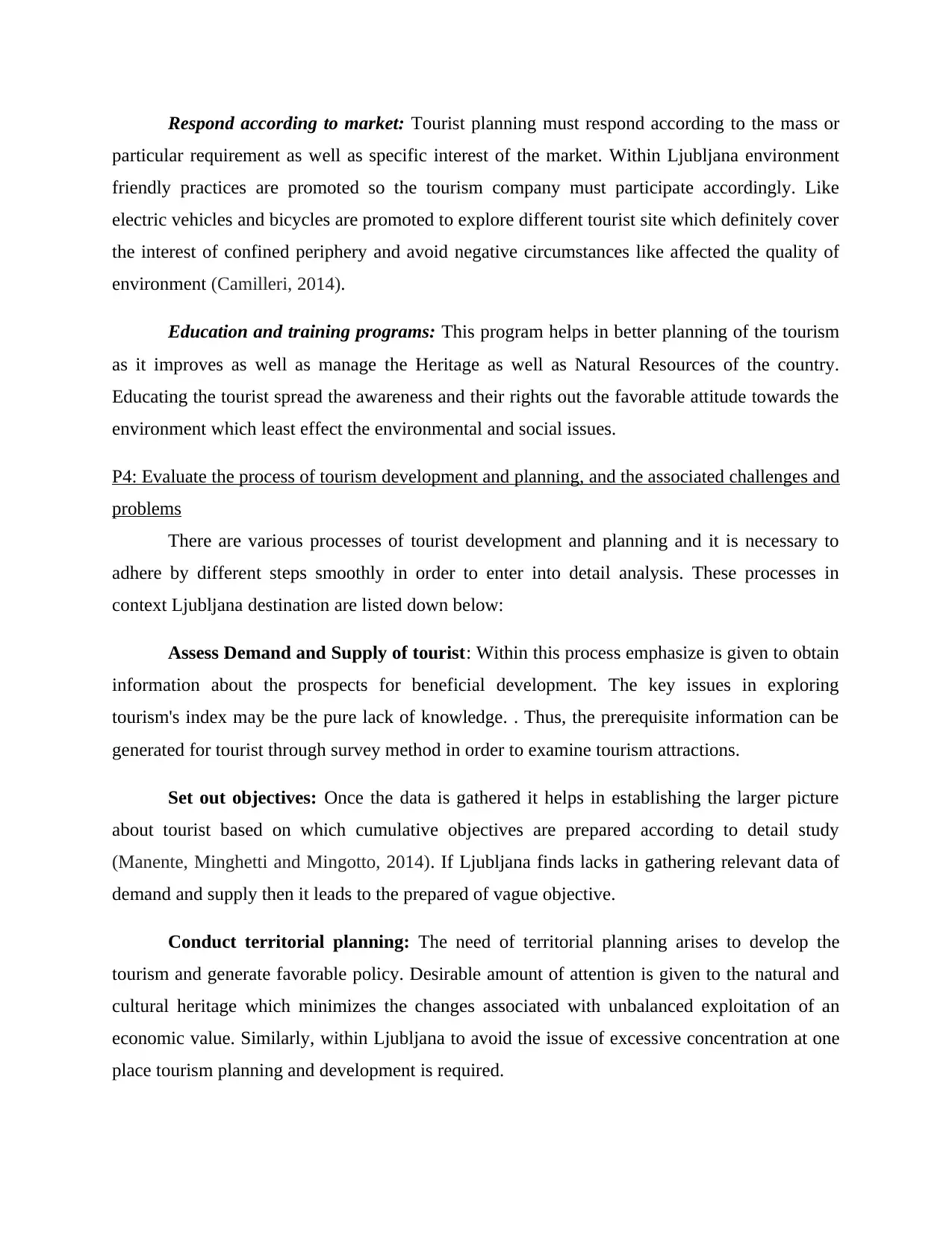
Respond according to market: Tourist planning must respond according to the mass or
particular requirement as well as specific interest of the market. Within Ljubljana environment
friendly practices are promoted so the tourism company must participate accordingly. Like
electric vehicles and bicycles are promoted to explore different tourist site which definitely cover
the interest of confined periphery and avoid negative circumstances like affected the quality of
environment (Camilleri, 2014).
Education and training programs: This program helps in better planning of the tourism
as it improves as well as manage the Heritage as well as Natural Resources of the country.
Educating the tourist spread the awareness and their rights out the favorable attitude towards the
environment which least effect the environmental and social issues.
P4: Evaluate the process of tourism development and planning, and the associated challenges and
problems
There are various processes of tourist development and planning and it is necessary to
adhere by different steps smoothly in order to enter into detail analysis. These processes in
context Ljubljana destination are listed down below:
Assess Demand and Supply of tourist: Within this process emphasize is given to obtain
information about the prospects for beneficial development. The key issues in exploring
tourism's index may be the pure lack of knowledge. . Thus, the prerequisite information can be
generated for tourist through survey method in order to examine tourism attractions.
Set out objectives: Once the data is gathered it helps in establishing the larger picture
about tourist based on which cumulative objectives are prepared according to detail study
(Manente, Minghetti and Mingotto, 2014). If Ljubljana finds lacks in gathering relevant data of
demand and supply then it leads to the prepared of vague objective.
Conduct territorial planning: The need of territorial planning arises to develop the
tourism and generate favorable policy. Desirable amount of attention is given to the natural and
cultural heritage which minimizes the changes associated with unbalanced exploitation of an
economic value. Similarly, within Ljubljana to avoid the issue of excessive concentration at one
place tourism planning and development is required.
particular requirement as well as specific interest of the market. Within Ljubljana environment
friendly practices are promoted so the tourism company must participate accordingly. Like
electric vehicles and bicycles are promoted to explore different tourist site which definitely cover
the interest of confined periphery and avoid negative circumstances like affected the quality of
environment (Camilleri, 2014).
Education and training programs: This program helps in better planning of the tourism
as it improves as well as manage the Heritage as well as Natural Resources of the country.
Educating the tourist spread the awareness and their rights out the favorable attitude towards the
environment which least effect the environmental and social issues.
P4: Evaluate the process of tourism development and planning, and the associated challenges and
problems
There are various processes of tourist development and planning and it is necessary to
adhere by different steps smoothly in order to enter into detail analysis. These processes in
context Ljubljana destination are listed down below:
Assess Demand and Supply of tourist: Within this process emphasize is given to obtain
information about the prospects for beneficial development. The key issues in exploring
tourism's index may be the pure lack of knowledge. . Thus, the prerequisite information can be
generated for tourist through survey method in order to examine tourism attractions.
Set out objectives: Once the data is gathered it helps in establishing the larger picture
about tourist based on which cumulative objectives are prepared according to detail study
(Manente, Minghetti and Mingotto, 2014). If Ljubljana finds lacks in gathering relevant data of
demand and supply then it leads to the prepared of vague objective.
Conduct territorial planning: The need of territorial planning arises to develop the
tourism and generate favorable policy. Desirable amount of attention is given to the natural and
cultural heritage which minimizes the changes associated with unbalanced exploitation of an
economic value. Similarly, within Ljubljana to avoid the issue of excessive concentration at one
place tourism planning and development is required.
Paraphrase This Document
Need a fresh take? Get an instant paraphrase of this document with our AI Paraphraser
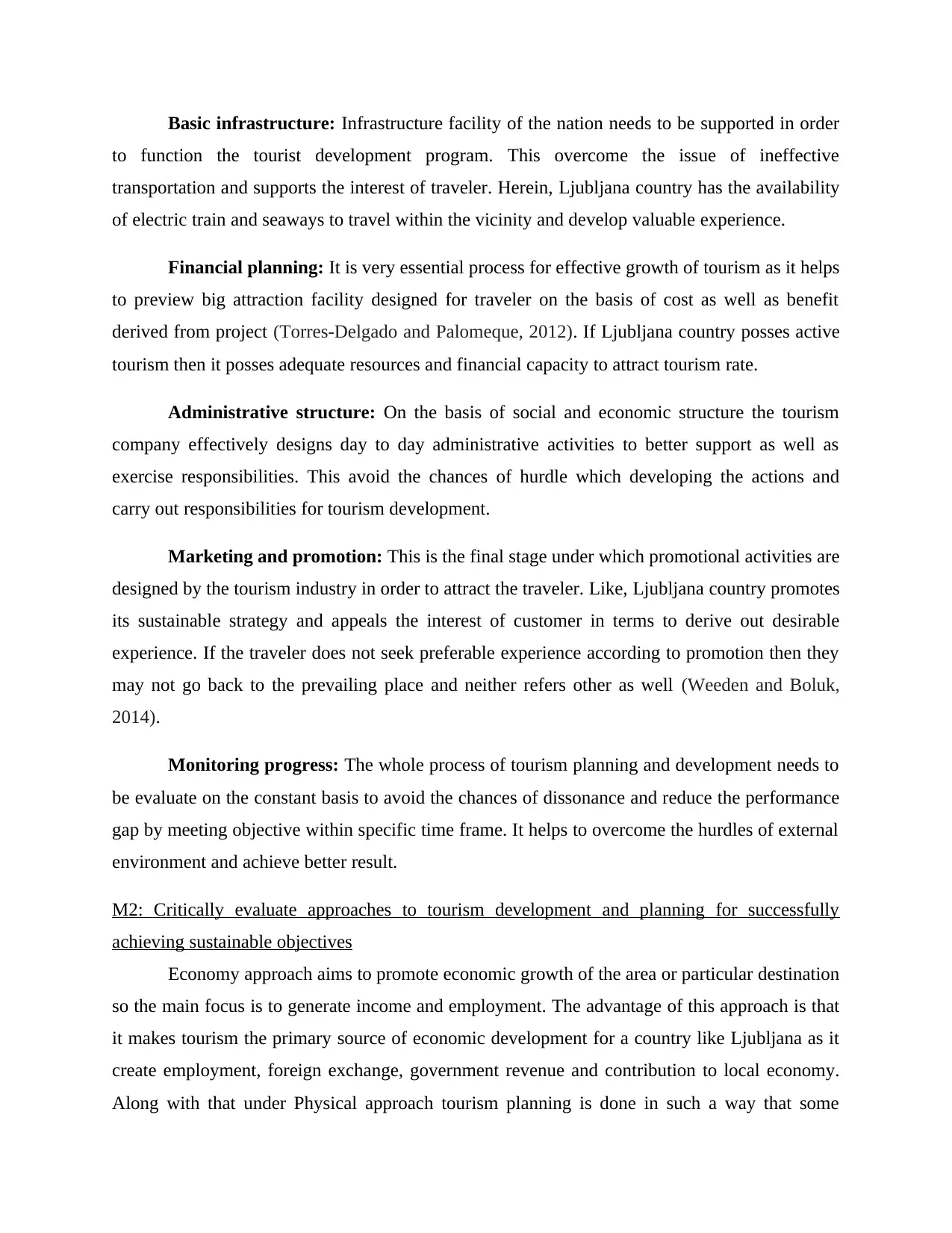
Basic infrastructure: Infrastructure facility of the nation needs to be supported in order
to function the tourist development program. This overcome the issue of ineffective
transportation and supports the interest of traveler. Herein, Ljubljana country has the availability
of electric train and seaways to travel within the vicinity and develop valuable experience.
Financial planning: It is very essential process for effective growth of tourism as it helps
to preview big attraction facility designed for traveler on the basis of cost as well as benefit
derived from project (Torres-Delgado and Palomeque, 2012). If Ljubljana country posses active
tourism then it posses adequate resources and financial capacity to attract tourism rate.
Administrative structure: On the basis of social and economic structure the tourism
company effectively designs day to day administrative activities to better support as well as
exercise responsibilities. This avoid the chances of hurdle which developing the actions and
carry out responsibilities for tourism development.
Marketing and promotion: This is the final stage under which promotional activities are
designed by the tourism industry in order to attract the traveler. Like, Ljubljana country promotes
its sustainable strategy and appeals the interest of customer in terms to derive out desirable
experience. If the traveler does not seek preferable experience according to promotion then they
may not go back to the prevailing place and neither refers other as well (Weeden and Boluk,
2014).
Monitoring progress: The whole process of tourism planning and development needs to
be evaluate on the constant basis to avoid the chances of dissonance and reduce the performance
gap by meeting objective within specific time frame. It helps to overcome the hurdles of external
environment and achieve better result.
M2: Critically evaluate approaches to tourism development and planning for successfully
achieving sustainable objectives
Economy approach aims to promote economic growth of the area or particular destination
so the main focus is to generate income and employment. The advantage of this approach is that
it makes tourism the primary source of economic development for a country like Ljubljana as it
create employment, foreign exchange, government revenue and contribution to local economy.
Along with that under Physical approach tourism planning is done in such a way that some
to function the tourist development program. This overcome the issue of ineffective
transportation and supports the interest of traveler. Herein, Ljubljana country has the availability
of electric train and seaways to travel within the vicinity and develop valuable experience.
Financial planning: It is very essential process for effective growth of tourism as it helps
to preview big attraction facility designed for traveler on the basis of cost as well as benefit
derived from project (Torres-Delgado and Palomeque, 2012). If Ljubljana country posses active
tourism then it posses adequate resources and financial capacity to attract tourism rate.
Administrative structure: On the basis of social and economic structure the tourism
company effectively designs day to day administrative activities to better support as well as
exercise responsibilities. This avoid the chances of hurdle which developing the actions and
carry out responsibilities for tourism development.
Marketing and promotion: This is the final stage under which promotional activities are
designed by the tourism industry in order to attract the traveler. Like, Ljubljana country promotes
its sustainable strategy and appeals the interest of customer in terms to derive out desirable
experience. If the traveler does not seek preferable experience according to promotion then they
may not go back to the prevailing place and neither refers other as well (Weeden and Boluk,
2014).
Monitoring progress: The whole process of tourism planning and development needs to
be evaluate on the constant basis to avoid the chances of dissonance and reduce the performance
gap by meeting objective within specific time frame. It helps to overcome the hurdles of external
environment and achieve better result.
M2: Critically evaluate approaches to tourism development and planning for successfully
achieving sustainable objectives
Economy approach aims to promote economic growth of the area or particular destination
so the main focus is to generate income and employment. The advantage of this approach is that
it makes tourism the primary source of economic development for a country like Ljubljana as it
create employment, foreign exchange, government revenue and contribution to local economy.
Along with that under Physical approach tourism planning is done in such a way that some
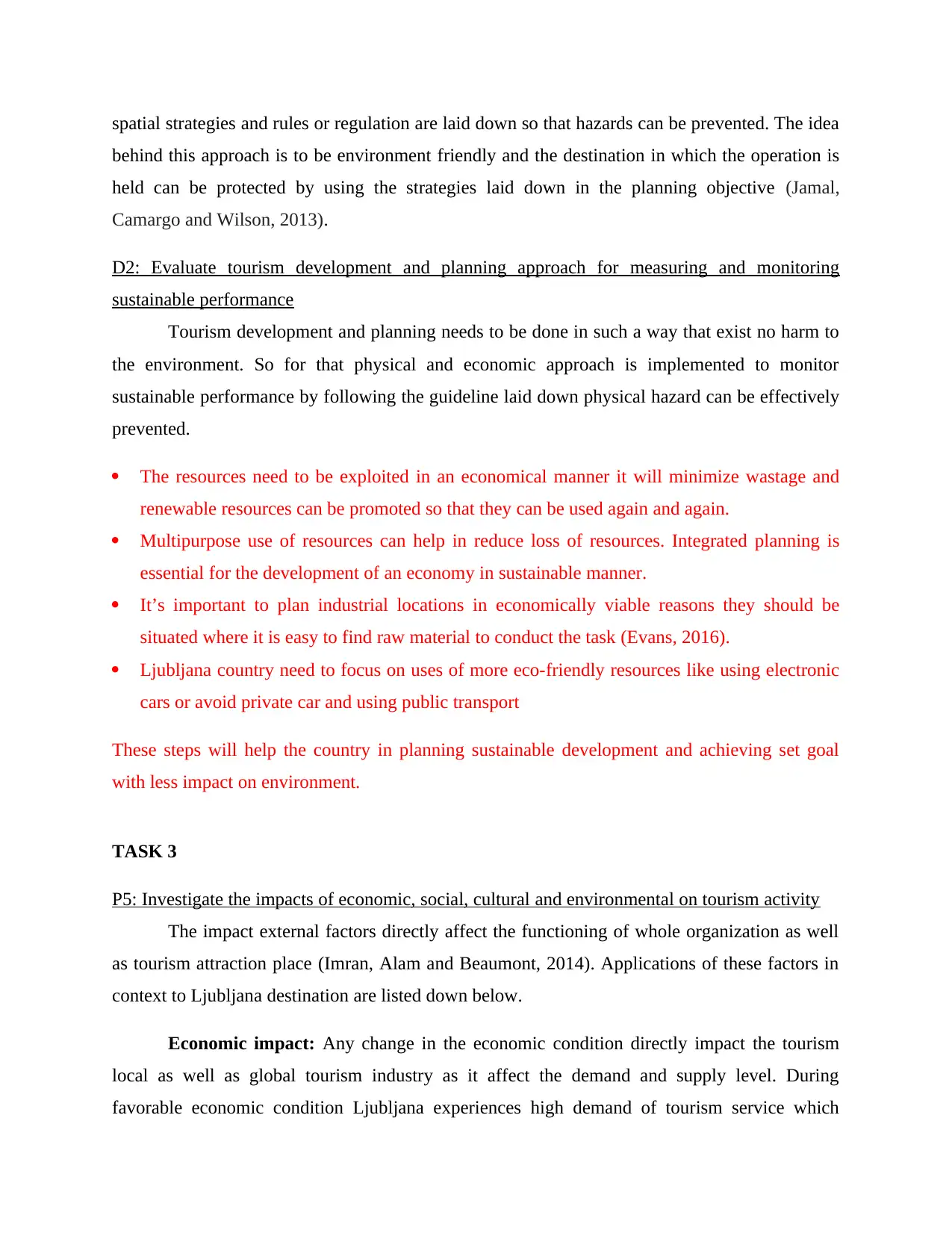
spatial strategies and rules or regulation are laid down so that hazards can be prevented. The idea
behind this approach is to be environment friendly and the destination in which the operation is
held can be protected by using the strategies laid down in the planning objective (Jamal,
Camargo and Wilson, 2013).
D2: Evaluate tourism development and planning approach for measuring and monitoring
sustainable performance
Tourism development and planning needs to be done in such a way that exist no harm to
the environment. So for that physical and economic approach is implemented to monitor
sustainable performance by following the guideline laid down physical hazard can be effectively
prevented.
The resources need to be exploited in an economical manner it will minimize wastage and
renewable resources can be promoted so that they can be used again and again.
Multipurpose use of resources can help in reduce loss of resources. Integrated planning is
essential for the development of an economy in sustainable manner.
It’s important to plan industrial locations in economically viable reasons they should be
situated where it is easy to find raw material to conduct the task (Evans, 2016).
Ljubljana country need to focus on uses of more eco-friendly resources like using electronic
cars or avoid private car and using public transport
These steps will help the country in planning sustainable development and achieving set goal
with less impact on environment.
TASK 3
P5: Investigate the impacts of economic, social, cultural and environmental on tourism activity
The impact external factors directly affect the functioning of whole organization as well
as tourism attraction place (Imran, Alam and Beaumont, 2014). Applications of these factors in
context to Ljubljana destination are listed down below.
Economic impact: Any change in the economic condition directly impact the tourism
local as well as global tourism industry as it affect the demand and supply level. During
favorable economic condition Ljubljana experiences high demand of tourism service which
behind this approach is to be environment friendly and the destination in which the operation is
held can be protected by using the strategies laid down in the planning objective (Jamal,
Camargo and Wilson, 2013).
D2: Evaluate tourism development and planning approach for measuring and monitoring
sustainable performance
Tourism development and planning needs to be done in such a way that exist no harm to
the environment. So for that physical and economic approach is implemented to monitor
sustainable performance by following the guideline laid down physical hazard can be effectively
prevented.
The resources need to be exploited in an economical manner it will minimize wastage and
renewable resources can be promoted so that they can be used again and again.
Multipurpose use of resources can help in reduce loss of resources. Integrated planning is
essential for the development of an economy in sustainable manner.
It’s important to plan industrial locations in economically viable reasons they should be
situated where it is easy to find raw material to conduct the task (Evans, 2016).
Ljubljana country need to focus on uses of more eco-friendly resources like using electronic
cars or avoid private car and using public transport
These steps will help the country in planning sustainable development and achieving set goal
with less impact on environment.
TASK 3
P5: Investigate the impacts of economic, social, cultural and environmental on tourism activity
The impact external factors directly affect the functioning of whole organization as well
as tourism attraction place (Imran, Alam and Beaumont, 2014). Applications of these factors in
context to Ljubljana destination are listed down below.
Economic impact: Any change in the economic condition directly impact the tourism
local as well as global tourism industry as it affect the demand and supply level. During
favorable economic condition Ljubljana experiences high demand of tourism service which
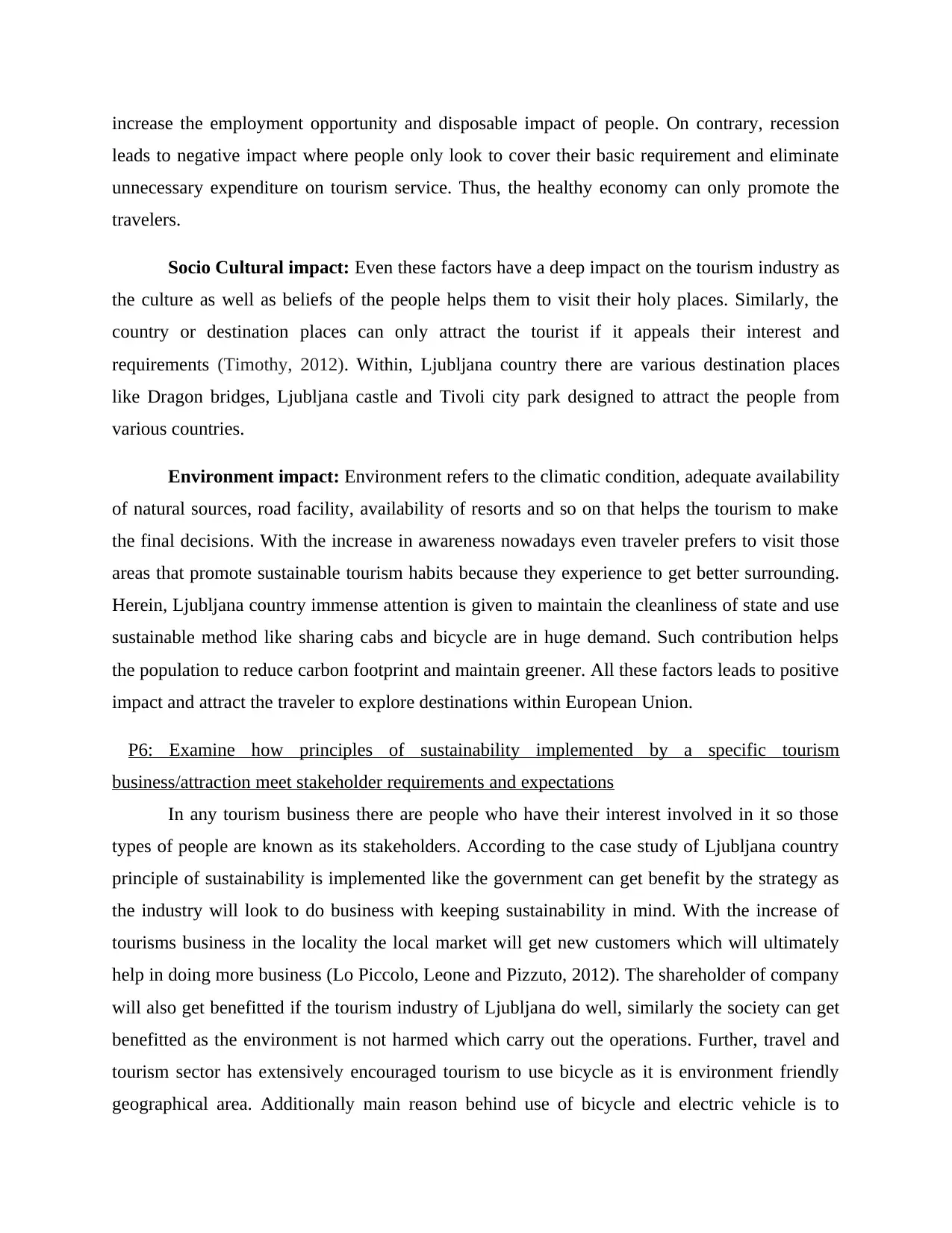
increase the employment opportunity and disposable impact of people. On contrary, recession
leads to negative impact where people only look to cover their basic requirement and eliminate
unnecessary expenditure on tourism service. Thus, the healthy economy can only promote the
travelers.
Socio Cultural impact: Even these factors have a deep impact on the tourism industry as
the culture as well as beliefs of the people helps them to visit their holy places. Similarly, the
country or destination places can only attract the tourist if it appeals their interest and
requirements (Timothy, 2012). Within, Ljubljana country there are various destination places
like Dragon bridges, Ljubljana castle and Tivoli city park designed to attract the people from
various countries.
Environment impact: Environment refers to the climatic condition, adequate availability
of natural sources, road facility, availability of resorts and so on that helps the tourism to make
the final decisions. With the increase in awareness nowadays even traveler prefers to visit those
areas that promote sustainable tourism habits because they experience to get better surrounding.
Herein, Ljubljana country immense attention is given to maintain the cleanliness of state and use
sustainable method like sharing cabs and bicycle are in huge demand. Such contribution helps
the population to reduce carbon footprint and maintain greener. All these factors leads to positive
impact and attract the traveler to explore destinations within European Union.
P6: Examine how principles of sustainability implemented by a specific tourism
business/attraction meet stakeholder requirements and expectations
In any tourism business there are people who have their interest involved in it so those
types of people are known as its stakeholders. According to the case study of Ljubljana country
principle of sustainability is implemented like the government can get benefit by the strategy as
the industry will look to do business with keeping sustainability in mind. With the increase of
tourisms business in the locality the local market will get new customers which will ultimately
help in doing more business (Lo Piccolo, Leone and Pizzuto, 2012). The shareholder of company
will also get benefitted if the tourism industry of Ljubljana do well, similarly the society can get
benefitted as the environment is not harmed which carry out the operations. Further, travel and
tourism sector has extensively encouraged tourism to use bicycle as it is environment friendly
geographical area. Additionally main reason behind use of bicycle and electric vehicle is to
leads to negative impact where people only look to cover their basic requirement and eliminate
unnecessary expenditure on tourism service. Thus, the healthy economy can only promote the
travelers.
Socio Cultural impact: Even these factors have a deep impact on the tourism industry as
the culture as well as beliefs of the people helps them to visit their holy places. Similarly, the
country or destination places can only attract the tourist if it appeals their interest and
requirements (Timothy, 2012). Within, Ljubljana country there are various destination places
like Dragon bridges, Ljubljana castle and Tivoli city park designed to attract the people from
various countries.
Environment impact: Environment refers to the climatic condition, adequate availability
of natural sources, road facility, availability of resorts and so on that helps the tourism to make
the final decisions. With the increase in awareness nowadays even traveler prefers to visit those
areas that promote sustainable tourism habits because they experience to get better surrounding.
Herein, Ljubljana country immense attention is given to maintain the cleanliness of state and use
sustainable method like sharing cabs and bicycle are in huge demand. Such contribution helps
the population to reduce carbon footprint and maintain greener. All these factors leads to positive
impact and attract the traveler to explore destinations within European Union.
P6: Examine how principles of sustainability implemented by a specific tourism
business/attraction meet stakeholder requirements and expectations
In any tourism business there are people who have their interest involved in it so those
types of people are known as its stakeholders. According to the case study of Ljubljana country
principle of sustainability is implemented like the government can get benefit by the strategy as
the industry will look to do business with keeping sustainability in mind. With the increase of
tourisms business in the locality the local market will get new customers which will ultimately
help in doing more business (Lo Piccolo, Leone and Pizzuto, 2012). The shareholder of company
will also get benefitted if the tourism industry of Ljubljana do well, similarly the society can get
benefitted as the environment is not harmed which carry out the operations. Further, travel and
tourism sector has extensively encouraged tourism to use bicycle as it is environment friendly
geographical area. Additionally main reason behind use of bicycle and electric vehicle is to
Secure Best Marks with AI Grader
Need help grading? Try our AI Grader for instant feedback on your assignments.
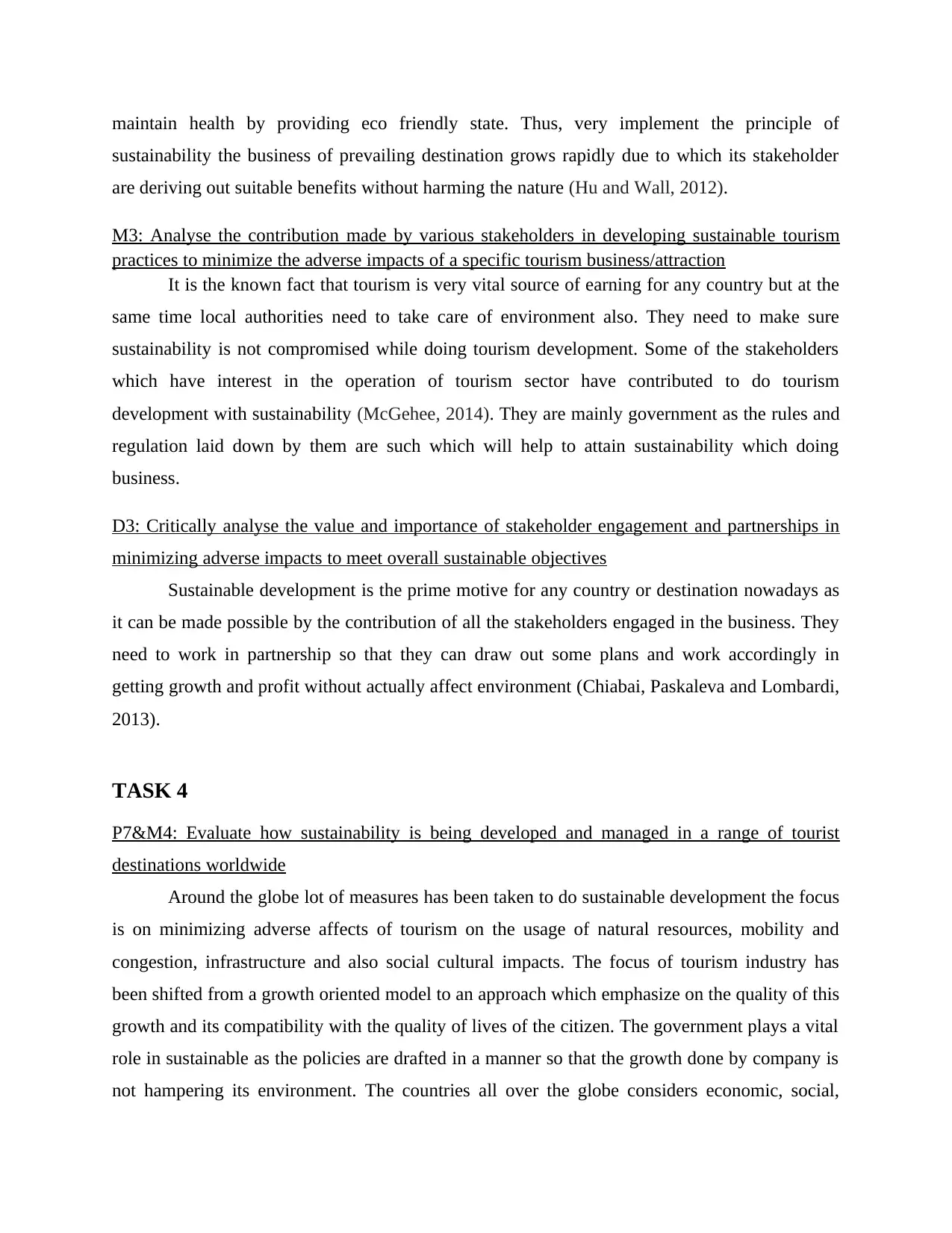
maintain health by providing eco friendly state. Thus, very implement the principle of
sustainability the business of prevailing destination grows rapidly due to which its stakeholder
are deriving out suitable benefits without harming the nature (Hu and Wall, 2012).
M3: Analyse the contribution made by various stakeholders in developing sustainable tourism
practices to minimize the adverse impacts of a specific tourism business/attraction
It is the known fact that tourism is very vital source of earning for any country but at the
same time local authorities need to take care of environment also. They need to make sure
sustainability is not compromised while doing tourism development. Some of the stakeholders
which have interest in the operation of tourism sector have contributed to do tourism
development with sustainability (McGehee, 2014). They are mainly government as the rules and
regulation laid down by them are such which will help to attain sustainability which doing
business.
D3: Critically analyse the value and importance of stakeholder engagement and partnerships in
minimizing adverse impacts to meet overall sustainable objectives
Sustainable development is the prime motive for any country or destination nowadays as
it can be made possible by the contribution of all the stakeholders engaged in the business. They
need to work in partnership so that they can draw out some plans and work accordingly in
getting growth and profit without actually affect environment (Chiabai, Paskaleva and Lombardi,
2013).
TASK 4
P7&M4: Evaluate how sustainability is being developed and managed in a range of tourist
destinations worldwide
Around the globe lot of measures has been taken to do sustainable development the focus
is on minimizing adverse affects of tourism on the usage of natural resources, mobility and
congestion, infrastructure and also social cultural impacts. The focus of tourism industry has
been shifted from a growth oriented model to an approach which emphasize on the quality of this
growth and its compatibility with the quality of lives of the citizen. The government plays a vital
role in sustainable as the policies are drafted in a manner so that the growth done by company is
not hampering its environment. The countries all over the globe considers economic, social,
sustainability the business of prevailing destination grows rapidly due to which its stakeholder
are deriving out suitable benefits without harming the nature (Hu and Wall, 2012).
M3: Analyse the contribution made by various stakeholders in developing sustainable tourism
practices to minimize the adverse impacts of a specific tourism business/attraction
It is the known fact that tourism is very vital source of earning for any country but at the
same time local authorities need to take care of environment also. They need to make sure
sustainability is not compromised while doing tourism development. Some of the stakeholders
which have interest in the operation of tourism sector have contributed to do tourism
development with sustainability (McGehee, 2014). They are mainly government as the rules and
regulation laid down by them are such which will help to attain sustainability which doing
business.
D3: Critically analyse the value and importance of stakeholder engagement and partnerships in
minimizing adverse impacts to meet overall sustainable objectives
Sustainable development is the prime motive for any country or destination nowadays as
it can be made possible by the contribution of all the stakeholders engaged in the business. They
need to work in partnership so that they can draw out some plans and work accordingly in
getting growth and profit without actually affect environment (Chiabai, Paskaleva and Lombardi,
2013).
TASK 4
P7&M4: Evaluate how sustainability is being developed and managed in a range of tourist
destinations worldwide
Around the globe lot of measures has been taken to do sustainable development the focus
is on minimizing adverse affects of tourism on the usage of natural resources, mobility and
congestion, infrastructure and also social cultural impacts. The focus of tourism industry has
been shifted from a growth oriented model to an approach which emphasize on the quality of this
growth and its compatibility with the quality of lives of the citizen. The government plays a vital
role in sustainable as the policies are drafted in a manner so that the growth done by company is
not hampering its environment. The countries all over the globe considers economic, social,
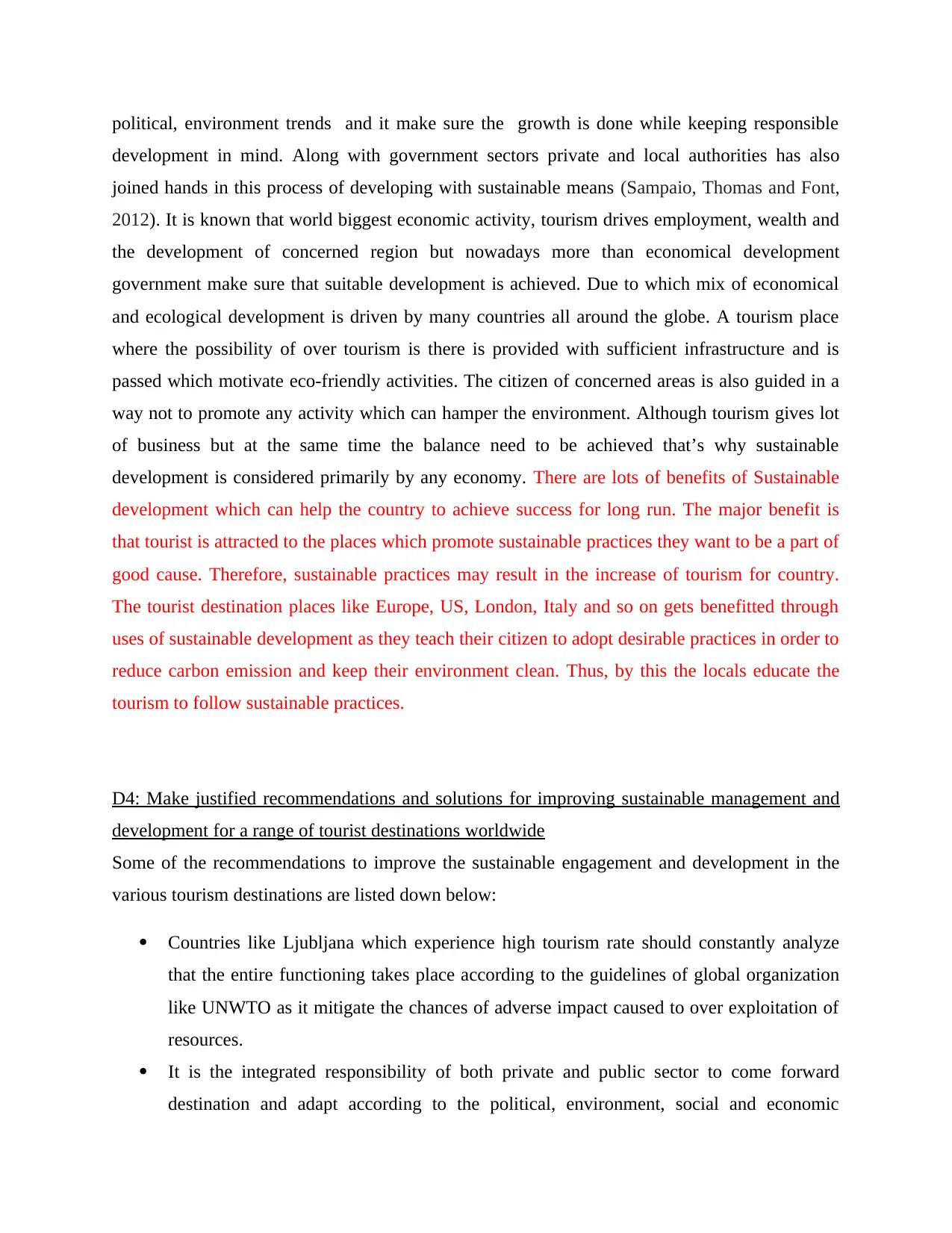
political, environment trends and it make sure the growth is done while keeping responsible
development in mind. Along with government sectors private and local authorities has also
joined hands in this process of developing with sustainable means (Sampaio, Thomas and Font,
2012). It is known that world biggest economic activity, tourism drives employment, wealth and
the development of concerned region but nowadays more than economical development
government make sure that suitable development is achieved. Due to which mix of economical
and ecological development is driven by many countries all around the globe. A tourism place
where the possibility of over tourism is there is provided with sufficient infrastructure and is
passed which motivate eco-friendly activities. The citizen of concerned areas is also guided in a
way not to promote any activity which can hamper the environment. Although tourism gives lot
of business but at the same time the balance need to be achieved that’s why sustainable
development is considered primarily by any economy. There are lots of benefits of Sustainable
development which can help the country to achieve success for long run. The major benefit is
that tourist is attracted to the places which promote sustainable practices they want to be a part of
good cause. Therefore, sustainable practices may result in the increase of tourism for country.
The tourist destination places like Europe, US, London, Italy and so on gets benefitted through
uses of sustainable development as they teach their citizen to adopt desirable practices in order to
reduce carbon emission and keep their environment clean. Thus, by this the locals educate the
tourism to follow sustainable practices.
D4: Make justified recommendations and solutions for improving sustainable management and
development for a range of tourist destinations worldwide
Some of the recommendations to improve the sustainable engagement and development in the
various tourism destinations are listed down below:
Countries like Ljubljana which experience high tourism rate should constantly analyze
that the entire functioning takes place according to the guidelines of global organization
like UNWTO as it mitigate the chances of adverse impact caused to over exploitation of
resources.
It is the integrated responsibility of both private and public sector to come forward
destination and adapt according to the political, environment, social and economic
development in mind. Along with government sectors private and local authorities has also
joined hands in this process of developing with sustainable means (Sampaio, Thomas and Font,
2012). It is known that world biggest economic activity, tourism drives employment, wealth and
the development of concerned region but nowadays more than economical development
government make sure that suitable development is achieved. Due to which mix of economical
and ecological development is driven by many countries all around the globe. A tourism place
where the possibility of over tourism is there is provided with sufficient infrastructure and is
passed which motivate eco-friendly activities. The citizen of concerned areas is also guided in a
way not to promote any activity which can hamper the environment. Although tourism gives lot
of business but at the same time the balance need to be achieved that’s why sustainable
development is considered primarily by any economy. There are lots of benefits of Sustainable
development which can help the country to achieve success for long run. The major benefit is
that tourist is attracted to the places which promote sustainable practices they want to be a part of
good cause. Therefore, sustainable practices may result in the increase of tourism for country.
The tourist destination places like Europe, US, London, Italy and so on gets benefitted through
uses of sustainable development as they teach their citizen to adopt desirable practices in order to
reduce carbon emission and keep their environment clean. Thus, by this the locals educate the
tourism to follow sustainable practices.
D4: Make justified recommendations and solutions for improving sustainable management and
development for a range of tourist destinations worldwide
Some of the recommendations to improve the sustainable engagement and development in the
various tourism destinations are listed down below:
Countries like Ljubljana which experience high tourism rate should constantly analyze
that the entire functioning takes place according to the guidelines of global organization
like UNWTO as it mitigate the chances of adverse impact caused to over exploitation of
resources.
It is the integrated responsibility of both private and public sector to come forward
destination and adapt according to the political, environment, social and economic
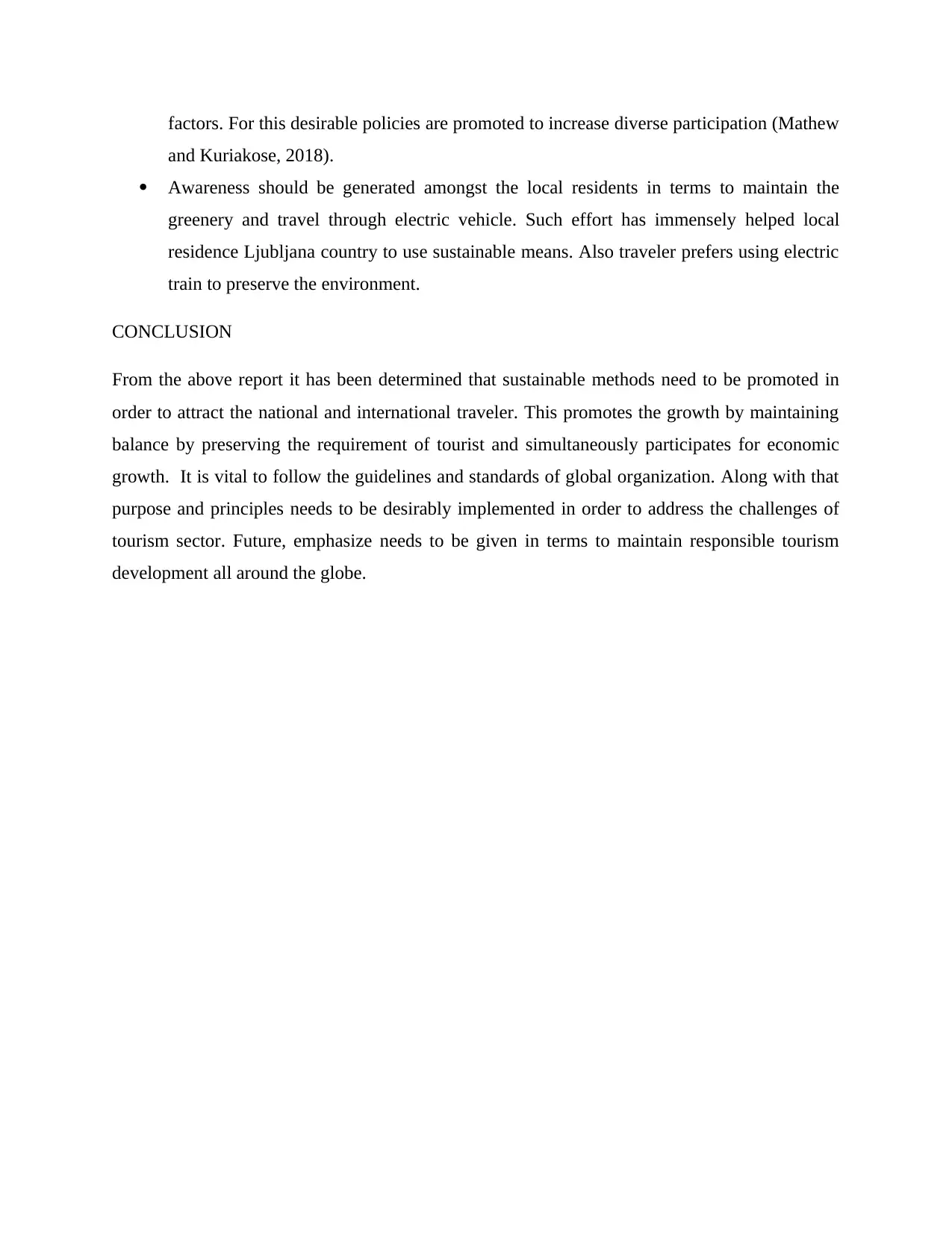
factors. For this desirable policies are promoted to increase diverse participation (Mathew
and Kuriakose, 2018).
Awareness should be generated amongst the local residents in terms to maintain the
greenery and travel through electric vehicle. Such effort has immensely helped local
residence Ljubljana country to use sustainable means. Also traveler prefers using electric
train to preserve the environment.
CONCLUSION
From the above report it has been determined that sustainable methods need to be promoted in
order to attract the national and international traveler. This promotes the growth by maintaining
balance by preserving the requirement of tourist and simultaneously participates for economic
growth. It is vital to follow the guidelines and standards of global organization. Along with that
purpose and principles needs to be desirably implemented in order to address the challenges of
tourism sector. Future, emphasize needs to be given in terms to maintain responsible tourism
development all around the globe.
and Kuriakose, 2018).
Awareness should be generated amongst the local residents in terms to maintain the
greenery and travel through electric vehicle. Such effort has immensely helped local
residence Ljubljana country to use sustainable means. Also traveler prefers using electric
train to preserve the environment.
CONCLUSION
From the above report it has been determined that sustainable methods need to be promoted in
order to attract the national and international traveler. This promotes the growth by maintaining
balance by preserving the requirement of tourist and simultaneously participates for economic
growth. It is vital to follow the guidelines and standards of global organization. Along with that
purpose and principles needs to be desirably implemented in order to address the challenges of
tourism sector. Future, emphasize needs to be given in terms to maintain responsible tourism
development all around the globe.
Paraphrase This Document
Need a fresh take? Get an instant paraphrase of this document with our AI Paraphraser
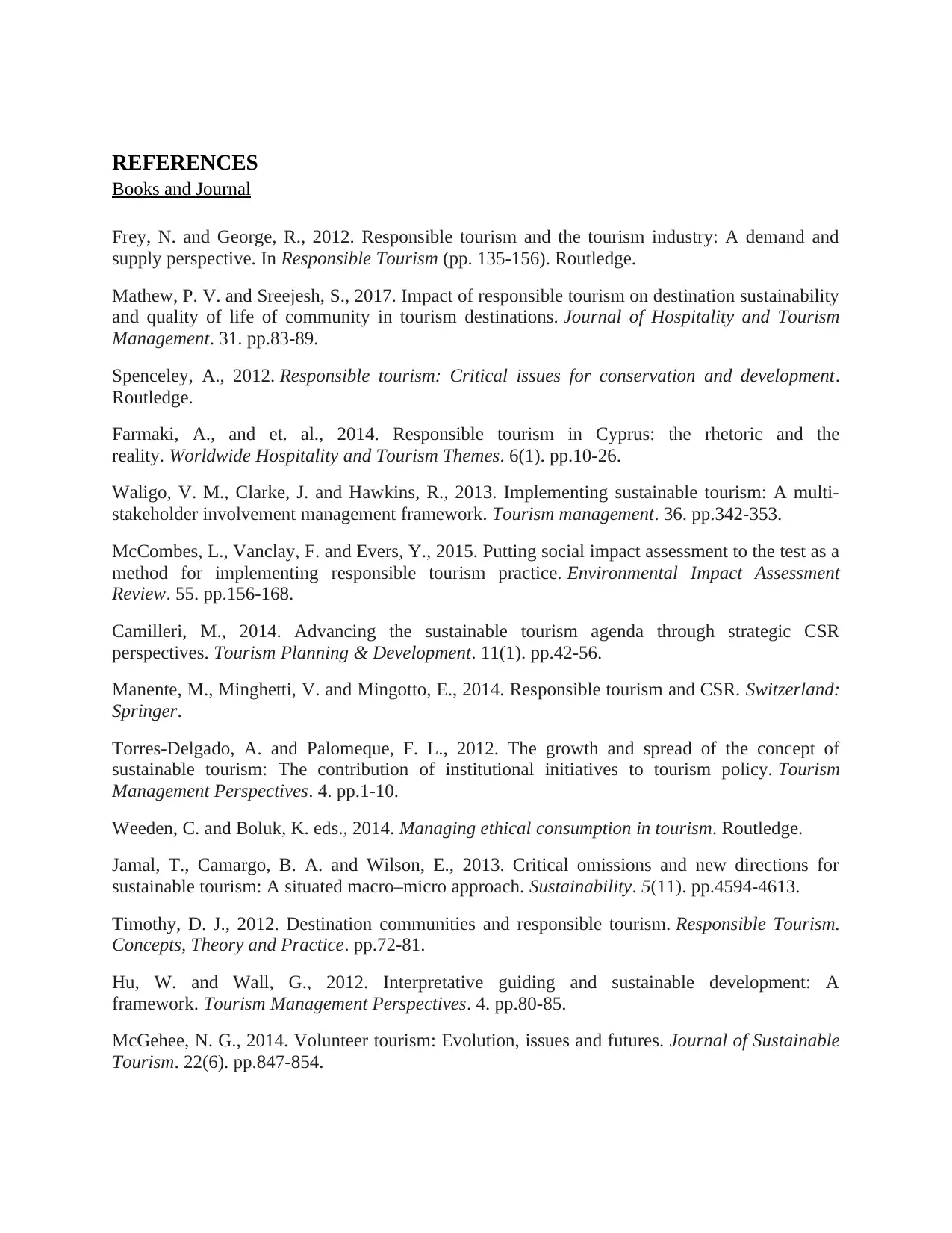
REFERENCES
Books and Journal
Frey, N. and George, R., 2012. Responsible tourism and the tourism industry: A demand and
supply perspective. In Responsible Tourism (pp. 135-156). Routledge.
Mathew, P. V. and Sreejesh, S., 2017. Impact of responsible tourism on destination sustainability
and quality of life of community in tourism destinations. Journal of Hospitality and Tourism
Management. 31. pp.83-89.
Spenceley, A., 2012. Responsible tourism: Critical issues for conservation and development.
Routledge.
Farmaki, A., and et. al., 2014. Responsible tourism in Cyprus: the rhetoric and the
reality. Worldwide Hospitality and Tourism Themes. 6(1). pp.10-26.
Waligo, V. M., Clarke, J. and Hawkins, R., 2013. Implementing sustainable tourism: A multi-
stakeholder involvement management framework. Tourism management. 36. pp.342-353.
McCombes, L., Vanclay, F. and Evers, Y., 2015. Putting social impact assessment to the test as a
method for implementing responsible tourism practice. Environmental Impact Assessment
Review. 55. pp.156-168.
Camilleri, M., 2014. Advancing the sustainable tourism agenda through strategic CSR
perspectives. Tourism Planning & Development. 11(1). pp.42-56.
Manente, M., Minghetti, V. and Mingotto, E., 2014. Responsible tourism and CSR. Switzerland:
Springer.
Torres-Delgado, A. and Palomeque, F. L., 2012. The growth and spread of the concept of
sustainable tourism: The contribution of institutional initiatives to tourism policy. Tourism
Management Perspectives. 4. pp.1-10.
Weeden, C. and Boluk, K. eds., 2014. Managing ethical consumption in tourism. Routledge.
Jamal, T., Camargo, B. A. and Wilson, E., 2013. Critical omissions and new directions for
sustainable tourism: A situated macro–micro approach. Sustainability. 5(11). pp.4594-4613.
Timothy, D. J., 2012. Destination communities and responsible tourism. Responsible Tourism.
Concepts, Theory and Practice. pp.72-81.
Hu, W. and Wall, G., 2012. Interpretative guiding and sustainable development: A
framework. Tourism Management Perspectives. 4. pp.80-85.
McGehee, N. G., 2014. Volunteer tourism: Evolution, issues and futures. Journal of Sustainable
Tourism. 22(6). pp.847-854.
Books and Journal
Frey, N. and George, R., 2012. Responsible tourism and the tourism industry: A demand and
supply perspective. In Responsible Tourism (pp. 135-156). Routledge.
Mathew, P. V. and Sreejesh, S., 2017. Impact of responsible tourism on destination sustainability
and quality of life of community in tourism destinations. Journal of Hospitality and Tourism
Management. 31. pp.83-89.
Spenceley, A., 2012. Responsible tourism: Critical issues for conservation and development.
Routledge.
Farmaki, A., and et. al., 2014. Responsible tourism in Cyprus: the rhetoric and the
reality. Worldwide Hospitality and Tourism Themes. 6(1). pp.10-26.
Waligo, V. M., Clarke, J. and Hawkins, R., 2013. Implementing sustainable tourism: A multi-
stakeholder involvement management framework. Tourism management. 36. pp.342-353.
McCombes, L., Vanclay, F. and Evers, Y., 2015. Putting social impact assessment to the test as a
method for implementing responsible tourism practice. Environmental Impact Assessment
Review. 55. pp.156-168.
Camilleri, M., 2014. Advancing the sustainable tourism agenda through strategic CSR
perspectives. Tourism Planning & Development. 11(1). pp.42-56.
Manente, M., Minghetti, V. and Mingotto, E., 2014. Responsible tourism and CSR. Switzerland:
Springer.
Torres-Delgado, A. and Palomeque, F. L., 2012. The growth and spread of the concept of
sustainable tourism: The contribution of institutional initiatives to tourism policy. Tourism
Management Perspectives. 4. pp.1-10.
Weeden, C. and Boluk, K. eds., 2014. Managing ethical consumption in tourism. Routledge.
Jamal, T., Camargo, B. A. and Wilson, E., 2013. Critical omissions and new directions for
sustainable tourism: A situated macro–micro approach. Sustainability. 5(11). pp.4594-4613.
Timothy, D. J., 2012. Destination communities and responsible tourism. Responsible Tourism.
Concepts, Theory and Practice. pp.72-81.
Hu, W. and Wall, G., 2012. Interpretative guiding and sustainable development: A
framework. Tourism Management Perspectives. 4. pp.80-85.
McGehee, N. G., 2014. Volunteer tourism: Evolution, issues and futures. Journal of Sustainable
Tourism. 22(6). pp.847-854.
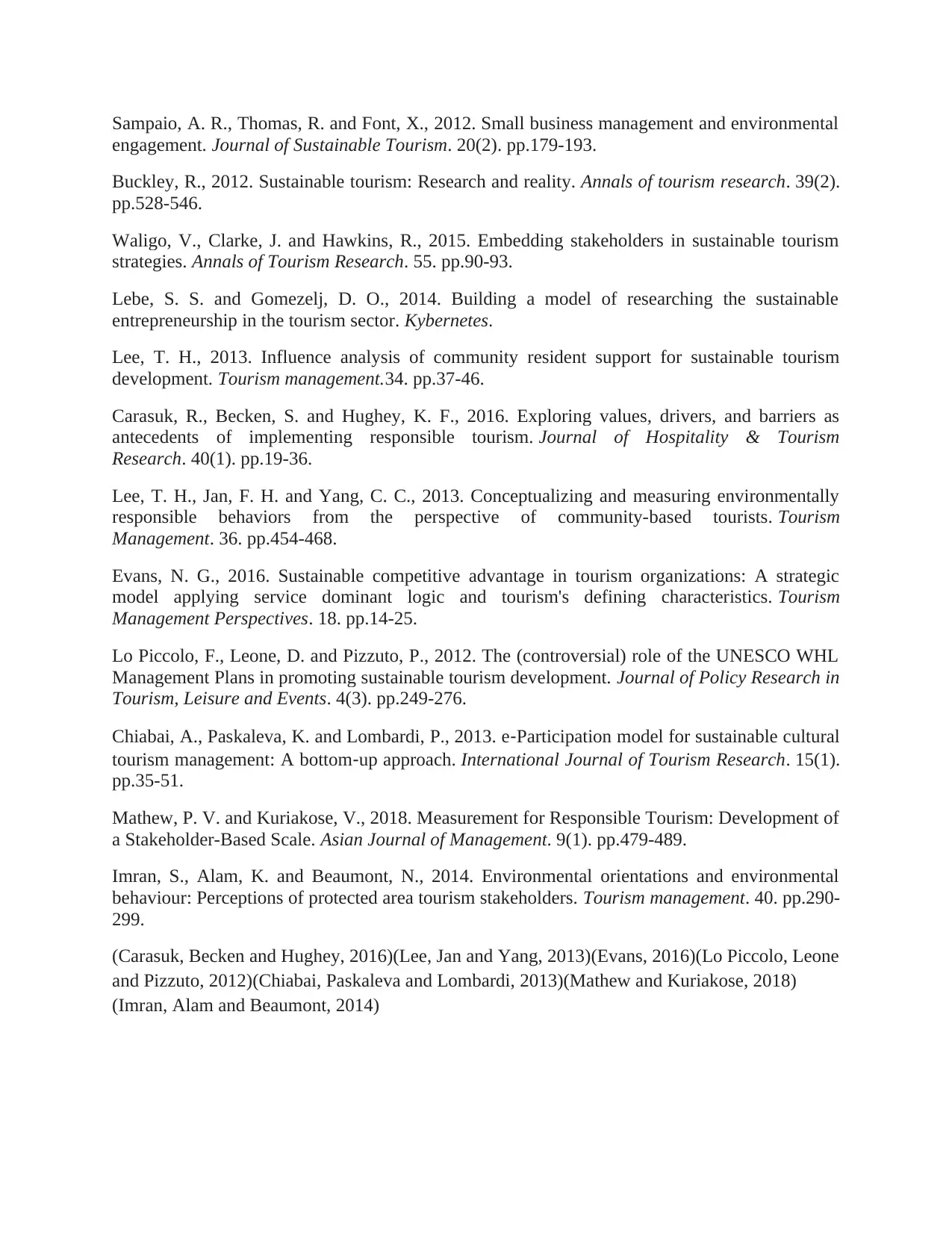
Sampaio, A. R., Thomas, R. and Font, X., 2012. Small business management and environmental
engagement. Journal of Sustainable Tourism. 20(2). pp.179-193.
Buckley, R., 2012. Sustainable tourism: Research and reality. Annals of tourism research. 39(2).
pp.528-546.
Waligo, V., Clarke, J. and Hawkins, R., 2015. Embedding stakeholders in sustainable tourism
strategies. Annals of Tourism Research. 55. pp.90-93.
Lebe, S. S. and Gomezelj, D. O., 2014. Building a model of researching the sustainable
entrepreneurship in the tourism sector. Kybernetes.
Lee, T. H., 2013. Influence analysis of community resident support for sustainable tourism
development. Tourism management.34. pp.37-46.
Carasuk, R., Becken, S. and Hughey, K. F., 2016. Exploring values, drivers, and barriers as
antecedents of implementing responsible tourism. Journal of Hospitality & Tourism
Research. 40(1). pp.19-36.
Lee, T. H., Jan, F. H. and Yang, C. C., 2013. Conceptualizing and measuring environmentally
responsible behaviors from the perspective of community-based tourists. Tourism
Management. 36. pp.454-468.
Evans, N. G., 2016. Sustainable competitive advantage in tourism organizations: A strategic
model applying service dominant logic and tourism's defining characteristics. Tourism
Management Perspectives. 18. pp.14-25.
Lo Piccolo, F., Leone, D. and Pizzuto, P., 2012. The (controversial) role of the UNESCO WHL
Management Plans in promoting sustainable tourism development. Journal of Policy Research in
Tourism, Leisure and Events. 4(3). pp.249-276.
Chiabai, A., Paskaleva, K. and Lombardi, P., 2013. e‐Participation model for sustainable cultural
tourism management: A bottom‐up approach. International Journal of Tourism Research. 15(1).
pp.35-51.
Mathew, P. V. and Kuriakose, V., 2018. Measurement for Responsible Tourism: Development of
a Stakeholder-Based Scale. Asian Journal of Management. 9(1). pp.479-489.
Imran, S., Alam, K. and Beaumont, N., 2014. Environmental orientations and environmental
behaviour: Perceptions of protected area tourism stakeholders. Tourism management. 40. pp.290-
299.
(Carasuk, Becken and Hughey, 2016)(Lee, Jan and Yang, 2013)(Evans, 2016)(Lo Piccolo, Leone
and Pizzuto, 2012)(Chiabai, Paskaleva and Lombardi, 2013)(Mathew and Kuriakose, 2018)
(Imran, Alam and Beaumont, 2014)
engagement. Journal of Sustainable Tourism. 20(2). pp.179-193.
Buckley, R., 2012. Sustainable tourism: Research and reality. Annals of tourism research. 39(2).
pp.528-546.
Waligo, V., Clarke, J. and Hawkins, R., 2015. Embedding stakeholders in sustainable tourism
strategies. Annals of Tourism Research. 55. pp.90-93.
Lebe, S. S. and Gomezelj, D. O., 2014. Building a model of researching the sustainable
entrepreneurship in the tourism sector. Kybernetes.
Lee, T. H., 2013. Influence analysis of community resident support for sustainable tourism
development. Tourism management.34. pp.37-46.
Carasuk, R., Becken, S. and Hughey, K. F., 2016. Exploring values, drivers, and barriers as
antecedents of implementing responsible tourism. Journal of Hospitality & Tourism
Research. 40(1). pp.19-36.
Lee, T. H., Jan, F. H. and Yang, C. C., 2013. Conceptualizing and measuring environmentally
responsible behaviors from the perspective of community-based tourists. Tourism
Management. 36. pp.454-468.
Evans, N. G., 2016. Sustainable competitive advantage in tourism organizations: A strategic
model applying service dominant logic and tourism's defining characteristics. Tourism
Management Perspectives. 18. pp.14-25.
Lo Piccolo, F., Leone, D. and Pizzuto, P., 2012. The (controversial) role of the UNESCO WHL
Management Plans in promoting sustainable tourism development. Journal of Policy Research in
Tourism, Leisure and Events. 4(3). pp.249-276.
Chiabai, A., Paskaleva, K. and Lombardi, P., 2013. e‐Participation model for sustainable cultural
tourism management: A bottom‐up approach. International Journal of Tourism Research. 15(1).
pp.35-51.
Mathew, P. V. and Kuriakose, V., 2018. Measurement for Responsible Tourism: Development of
a Stakeholder-Based Scale. Asian Journal of Management. 9(1). pp.479-489.
Imran, S., Alam, K. and Beaumont, N., 2014. Environmental orientations and environmental
behaviour: Perceptions of protected area tourism stakeholders. Tourism management. 40. pp.290-
299.
(Carasuk, Becken and Hughey, 2016)(Lee, Jan and Yang, 2013)(Evans, 2016)(Lo Piccolo, Leone
and Pizzuto, 2012)(Chiabai, Paskaleva and Lombardi, 2013)(Mathew and Kuriakose, 2018)
(Imran, Alam and Beaumont, 2014)
1 out of 15
Related Documents
Your All-in-One AI-Powered Toolkit for Academic Success.
+13062052269
info@desklib.com
Available 24*7 on WhatsApp / Email
![[object Object]](/_next/static/media/star-bottom.7253800d.svg)
Unlock your academic potential
© 2024 | Zucol Services PVT LTD | All rights reserved.




